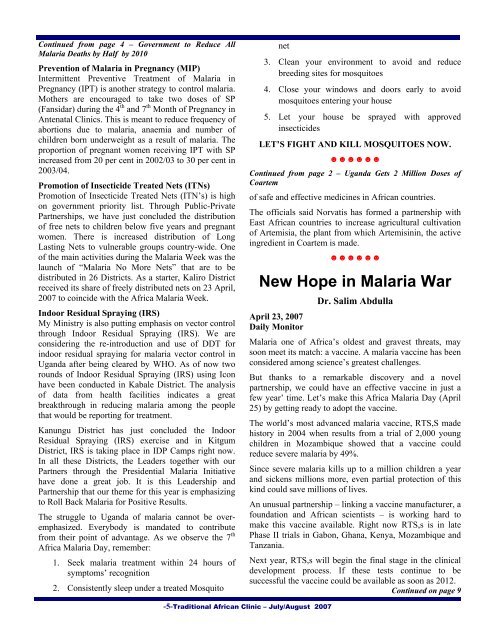African Traditional Herbal Research Clinic ... - Blackherbals.com
African Traditional Herbal Research Clinic ... - Blackherbals.com
African Traditional Herbal Research Clinic ... - Blackherbals.com
- No tags were found...
Create successful ePaper yourself
Turn your PDF publications into a flip-book with our unique Google optimized e-Paper software.
Continued from page 4 – Government to Reduce AllMalaria Deaths by Half by 2010Prevention of Malaria in Pregnancy (MIP)Intermittent Preventive Treatment of Malaria inPregnancy (IPT) is another strategy to control malaria.Mothers are encouraged to take two doses of SP(Fansidar) during the 4 th and 7 th Month of Pregnancy inAntenatal <strong>Clinic</strong>s. This is meant to reduce frequency ofabortions due to malaria, anaemia and number ofchildren born underweight as a result of malaria. Theproportion of pregnant women receiving IPT with SPincreased from 20 per cent in 2002/03 to 30 per cent in2003/04.Promotion of Insecticide Treated Nets (ITNs)Promotion of Insecticide Treated Nets (ITN’s) is highon government priority list. Through Public-PrivatePartnerships, we have just concluded the distributionof free nets to children below five years and pregnantwomen. There is increased distribution of LongLasting Nets to vulnerable groups country-wide. Oneof the main activities during the Malaria Week was thelaunch of “Malaria No More Nets” that are to bedistributed in 26 Districts. As a starter, Kaliro Districtreceived its share of freely distributed nets on 23 April,2007 to coincide with the Africa Malaria Week.Indoor Residual Spraying (IRS)My Ministry is also putting emphasis on vector controlthrough Indoor Residual Spraying (IRS). We areconsidering the re-introduction and use of DDT forindoor residual spraying for malaria vector control inUganda after being cleared by WHO. As of now tworounds of Indoor Residual Spraying (IRS) using Iconhave been conducted in Kabale District. The analysisof data from health facilities indicates a greatbreakthrough in reducing malaria among the peoplethat would be reporting for treatment.Kanungu District has just concluded the IndoorResidual Spraying (IRS) exercise and in KitgumDistrict, IRS is taking place in IDP Camps right now.In all these Districts, the Leaders together with ourPartners through the Presidential Malaria Initiativehave done a great job. It is this Leadership andPartnership that our theme for this year is emphasizingto Roll Back Malaria for Positive Results.The struggle to Uganda of malaria cannot be overemphasized.Everybody is mandated to contributefrom their point of advantage. As we observe the 7 thAfrica Malaria Day, remember:1. Seek malaria treatment within 24 hours ofsymptoms’ recognition2. Consistently sleep under a treated Mosquitonet3. Clean your environment to avoid and reducebreeding sites for mosquitoes4. Close your windows and doors early to avoidmosquitoes entering your house5. Let your house be sprayed with approvedinsecticidesLET’S FIGHT AND KILL MOSQUITOES NOW.☻☻☻☻☻☻Continued from page 2 – Uganda Gets 2 Million Doses ofCoartemof safe and effective medicines in <strong>African</strong> countries.The officials said Norvatis has formed a partnership withEast <strong>African</strong> countries to increase agricultural cultivationof Artemisia, the plant from which Artemisinin, the activeingredient in Coartem is made.☻☻☻☻☻☻New Hope in Malaria WarDr. Salim AbdullaApril 23, 2007Daily MonitorMalaria one of Africa’s oldest and gravest threats, maysoon meet its match: a vaccine. A malaria vaccine has beenconsidered among science’s greatest challenges.But thanks to a remarkable discovery and a novelpartnership, we could have an effective vaccine in just afew year’ time. Let’s make this Africa Malaria Day (April25) by getting ready to adopt the vaccine.The world’s most advanced malaria vaccine, RTS,S madehistory in 2004 when results from a trial of 2,000 youngchildren in Mozambique showed that a vaccine couldreduce severe malaria by 49%.Since severe malaria kills up to a million children a yearand sickens millions more, even partial protection of thiskind could save millions of lives.An unusual partnership – linking a vaccine manufacturer, afoundation and <strong>African</strong> scientists – is working hard tomake this vaccine available. Right now RTS,s is in latePhase II trials in Gabon, Ghana, Kenya, Mozambique andTanzania.Next year, RTS,s will begin the final stage in the clinicaldevelopment process. If these tests continue to besuccessful the vaccine could be available as soon as 2012.Continued on page 9-5-<strong>Traditional</strong> <strong>African</strong> <strong>Clinic</strong> – July/August 2007
















